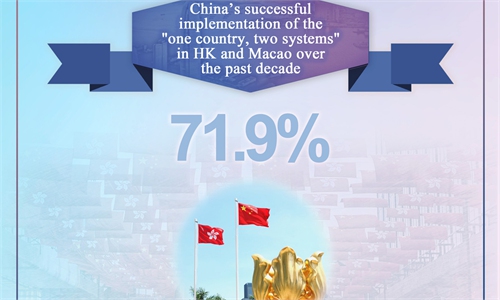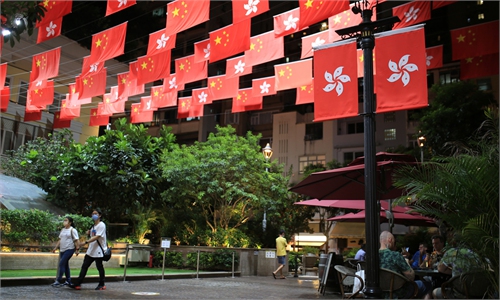HKers share deeper understanding of the CPC as Party Congress points out the direction for HKSAR
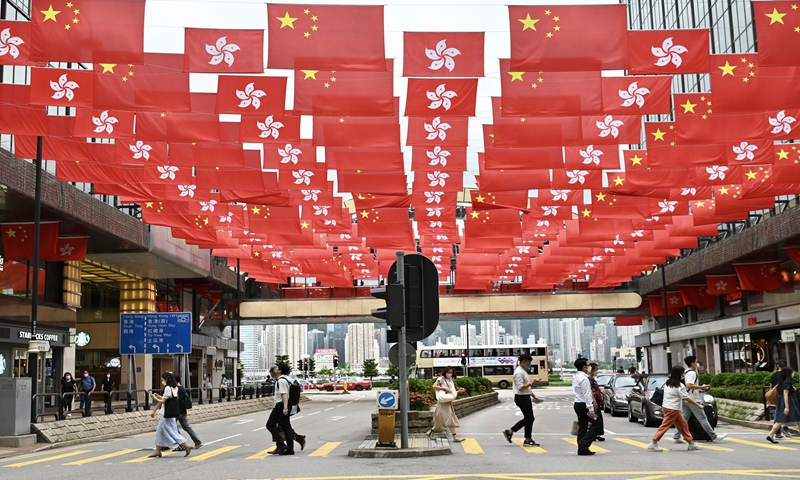
Chinese national flag and the flag of the HKSAR are flown across streets in Tsim Sha Tsui, Hong Kong, in June 2022 to celebrate the 25th anniversary of the city's return to the motherland. Photo: IC
As the 20th National Congress of the Communist Party of China (CPC) opened on Sunday in Beijing, people of all walks of life in the Hong Kong Special Administrative Region (HKSAR) are not only paying more attention to the event that carries historic political significance for the entire Chinese nation, but also intently studying the important political agenda of the CPC with great interests, in a marked shift from previous years.
For a long time, the image of the CPC has been distorted, demonized, and slandered by anti-government groups in the HKSAR along with hostile outside forces with ulterior motives, leaving little room for Hong Kong residents to learn about the Party in the objective way that led 1.4 billion people to achieve China's economic miracle over the last few decades and has taken the country on a new journey toward building a modern socialist country in all respects. But over the past three years, as the CPC's leadership role became increasingly prominent in advancing the One Country, Two Systems and in helping the HKSAR overcome turmoil and restore order, the Hong Kong society's understanding of and interests in the Party also increased immensely.
On the opening day of the 20th National Congress of the CPC, HKSAR Chief Executive John Lee Ka-chiu shared a photo of himself watching the live-stream of the opening on his Weibo account, warmly welcoming the holding of the Congress. The report delivered by Xi Jinping to the 20th CPC National Congress mentioned the One Country, Two Systems policy and the work on Hong Kong and Macao affairs, which has far-reaching and great significance, fully showing that the central government attaches high importance to the One Country, Two Systems and the work therein, Lee said.
While the last decade has been the most critical period for the practice of the One Country, Two Systems in Hong Kong and the city's governance and development have ushered in an important turning point, Hong Kong residents have also had a deeper understanding of the CPC, and some representatives from different sectors of Hong Kong society shared their thought with the Global Times. Particularly, the decisive implementation of the National Security Law for Hong Kong in 2020 drew a bottom line for safeguarding of national security, while the CPC celebrated its centenary in 2021, which are considered to be two important turning points, some noted.
"Before 2020, although Hong Kong residents knew the CPC, they did not truly understand it. Some even thought that it was mysterious," Wendy Hong Wen, a legislator who was born on the Chinese mainland, told the Global Times in a recent interview, adding that many did not even see the prominent role of the CPC, before the CPC's centenary in 2021 was widely celebrated in Hong Kong.
In the eyes of Hong Kong political elites and observers, the CPC had kept a low-profile in Hong Kong society in the past. Though the Party pioneered, advanced and upheld the One Country, Two Systems, Hong Kong-related policies had been mostly carried out through the central government or the National People's Congress rather than directly through the identity of the CPC. Western and local anti-government forces took advantage of this to smear the CPC and poison the city's ideological front.
In the past, our general public opinion actually avoided topics related to the Party, leaving a vacuum in their perceptions of the Party, which led to misunderstandings and speculations, Victor Chan Chi-ho, vice chairman of the Hong Kong Association of Young Commentators, told the Global Times. "Certain fears and negative sentiments toward the Party still exist in Hong Kong society today, which makes open and positive communication about the Party all more necessary."
Hong, the lawmaker who has lived both on the Chinese mainland and in Hong Kong, said there were generally three groups of people when it comes to how to perceive the CPC in Hong Kong. "Some people were not interested in learning about the Party. With the high degree of autonomy guaranteed by the One Country, Two Systems, they didn't care about the situation on the mainland and the Party seemed [too distant]."
"The second group openly rejected and opposed the CPC. In the past, when political confrontation in Hong Kong escalated, the opposition camp took the opposite side to the CPC in terms of ideology as they fully accept Western values and ideas, and the Western political system and the Western parties were often taken as a reference with which to evaluate the CPC," she said.
Hong further pointed out that the third group didn't have the capability to learn about the Party in an objective way, as those people were easily influenced by the opposition groups and mass media.
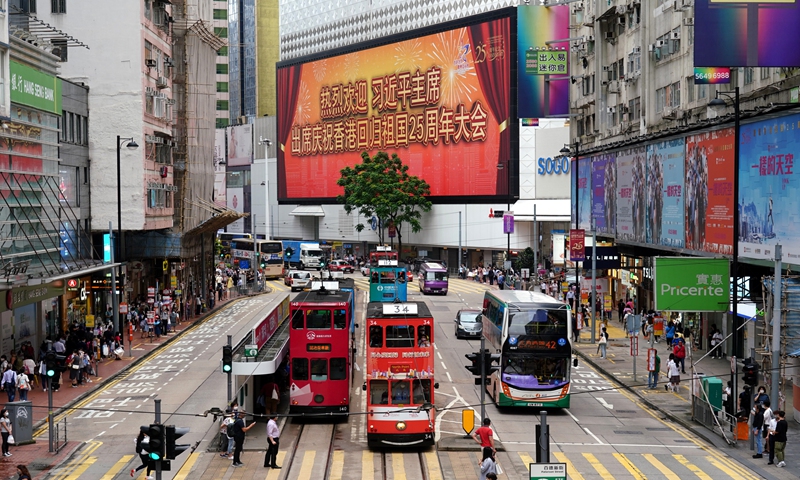
A giant screen displayed on the streets of Causeway Bay in Hong Kong shows "warmly welcome President Xi Jinping to celebrate the 25th anniversary of Hong Kong's return to the motherland." Photo: IC
In June 2021, a forum, under the title of "CPC and One Country, Two Systems," was held in Hong Kong to mark the 100th anniversary of the founding of the CPC, during which Luo Huining, director of the liaison office of the central government in Hong Kong stressed the leadership of the CPC in advancing the cause of the One Country, Two Systems.
Now, the CPC was front and center in Hong Kong and more local residents began to learn about the great achievements made by the CPC such as fighting corruption and poverty alleviation. For instance, a rare sight on Hong Kong television networks - No Poverty Land - a Hong Kong-produced documentary series about poverty alleviation on the mainland won high praise from viewers in Hong Kong in 2021.
This week, some Hong Kong residents also paid high attention to the 20th National Congress of the CPC, highly anticipating Xi's report to the Congress, which is believed to lay out the future direction and guidelines to be taken by the development of the nation and also the city. Some Hong Kong residents also noticed that local media sources and public opinion have paid greater attention to the Party's major event by covering it with analyses, columns, and features, as it's also an event of great significance with China's visions and experience on state governance being all summed up.
Despite Hong Kong residents beginning to know the Party, there's still a long way to go for them to form a correct understanding of it. Some political elites and lawmakers suggested that Hong Kong society first needs to deeply reflect on where the One Country, Two Systems comes from, why the Party can make such achievements that are also great contributions to the world, and why a Chinese path to modernization has won such overwhelming support from the Chinese people, which is the level of support that Western political groups can't match.
Lawrence Tang Fei, the vice-chairman of the Hong Kong Federation of Education Workers, told the Global Times that there are two ways to improve the understanding of Hong Kong residents, especially among the young generation, about the CPC both inside and outside the campus. "We have to improve our school curriculum first," he said. "For a long time in the past, we only mentioned the country's system or the system of government by avoiding mention of the CPC," Tang said.
If students ask what the 20th National Congress of the CPC is, and if those contents are not mentioned in textbooks, how can teachers better explain the event's significance? Such shortcomings must be tackled by introducing the CPC's organization and structure as well as its history into our curriculum for the teaching of Chinese history and citizenship education, he said.
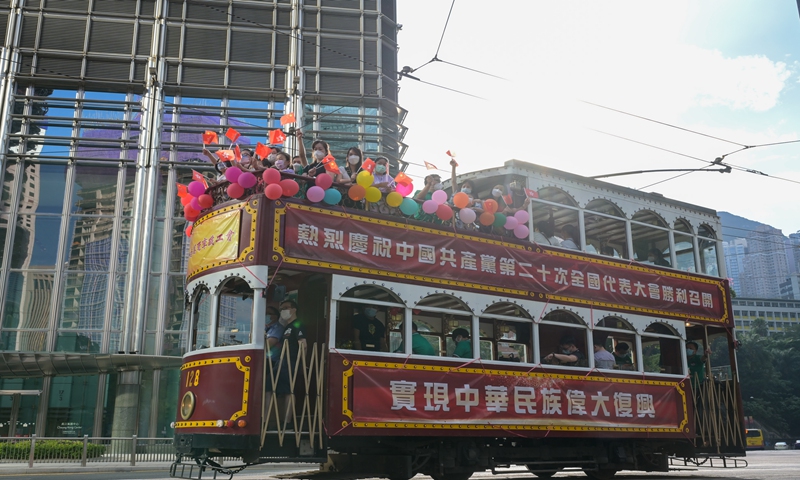
A bus tour in Hong Kong to celebrate the 20th National Congress of the CPC that opened on October 16 in Beijing Photo: IC
Since the implementation of the National Security Law for Hong Kong and electoral reform, I believe that more and more Hong Kong residents now share such feelings about the policies directly advanced by the CPC and understand that the Party's decisions are intrinsically tied to the future of the city, said Chan, who also represents a Hong Kong youth alliance.
"The basic thing we should know is that the CPC is positioned at the core of China's political system, both from the constitutional aspect and as a political reality. And its core leadership is also underscored in the practice of the One Country, Two Systems that more Hong Kong residents need to know," he said.
In the report, Xi stressed that upholding and improving the policy of One Country, Two Systems. He said the policy is a great innovation of socialism with Chinese characteristics. The policy must be adhered to over the long term, Xi said.
"We will fully, faithfully, and resolutely implement the policy of One Country, Two Systems, under which the people of Hong Kong administer Hong Kong and the people of Macao administer Macao, both with a high degree of autonomy. We will remain committed to law-based governance in Hong Kong and Macao," Xi said.
Observers believe that in the future, on issues related to social turmoil, safeguarding national security and interests and ensuring the correct implementation of One Country, Two Systems policy, the CPC has to provide strong leadership. However, in promoting the overall recognition of the CPC in Hong Kong society, this must be handled with care and patience. The general principle is to let Hong Kong residents know that the CPC is a Party of prestige and ability, and also a strong and necessary political force that aligns with the interests of Hong Kong residents, and earnestly contributes to the welfare of the Chinese people and to the building of a prosperous and strong China.

